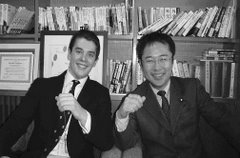
I recently visited
Kaiyo Gakuen, a brave new "adventure" into the turbulent world of Japanese educational reform.
Kaiyo is an all boys, all boarding-style school. The focus is on sports, academic excellence and leadership training; as the school's blurb puts it, "Kaiyo Gakuen nurtures the personal skills and academic prowess necessary for leaders." Praised by
aficionados of
British boarding-school education--indeed, much of Kaiyo's influence was drawn from England's Eton College, and a member of Eton's teaching staff currently works as an 'advisor'--the school has also come under fire from the Japan Communist Party (JCP) and leftist members of the Japanese Teachers' Union, who maintain it is elitist and unrepresentative. Which of course it is. And proud of it.
The school is bursting with business donors, JR and Toyota among them, and has a campus with state-of-the-art facilities and its own special train station nearby. Students work hard by day, and return to 'Houses'
(hausu) in the evening and at weekends, where they enter a whole new world of 'rounded' training to be the country's next leaders. On Sunday students are whisked off by their Housemasters and 'Floormasters' (staffed by mid-level managers from some of Kaiyo's sponsors) to do anything from planting rice in local paddies to yachting in the sea beside the school. Social-awareness projects, giving students exposure to all walks of life, are planned for the future.
Yet despite all the fanfare about leadership, there are fears that Kaiyo may have missed a trick.
Some quarters have argued that the regimentation of daily life, and the equipping of every student with a trackable PDA device, is not exactly conducive to lateral thinking and leadership. Others claim that an enclosed all-boy environment, where the only exposure to women is the kitchen staff, gives Kaiyo's students a distorted view of reality. Yet, in my view, more potentially disastrous than either of these factors are the educational limits of the Kaiyo world.
The attraction of 'Public Schools' like Eton College are the intellectual freedoms they offer their students. Science labs, soccer fields, drama theatres, or art studios; by and large students can choose what they individually excel at, and pursue their own academic (or not-so-academic)course. Kaiyo, however, does not have a theatre. The bigwigs in management seemed surprised that this was an issue at all: "...But we have science labs and sports facilities..." the Headmaster replied to my questioning, obviously oblivious that leadership could take any form other than scientific or physical excellence.
But is not an element of drama essential for leadership? To observe the Diet's poor excuses for debates, or to listen to political speeches, is a saddening experience. Performance and charisma are absent 99% of the time. A theatre, which Kaiyo students could use to perform whatever they wanted--be it drama, music, or anything else--would be an invaluable preparation for a future life of leadership.
Another mistake was the failure to inject Kaiyo with any sense of history or culture. This may perhaps be the fault of the main architects of the project, who are almost exclusively characters from business and industrial backgrounds. As Japanese parliamentarian, Motohisa Furukawa, exclaimed upon being explained the school's facilities, "What? You don't have a tea-house? But how can students learn about Japanese culture?"
A sense of history is essential for the leaders of tomorrow. Take the current US administration, for example. A brief look at the history books--at the disastrous British occupation of Iraq in the inter-war era--would have given a scarily accurate prediction of the rivers of blood that are currently soaking into the desert sands. A mere wikipedic knowledge of world civilizations might have warned leaders that a universalist, paradigm-led invasion and occupation in the Middle East, in all its ugly hubris, would ultimately end in failure.
The absence of a tea-house in Kaiyo goes beyond slimming down choices on offer to students; it is a failure to connect Kaiyo to Japanese history and culture. As a student at Eton, in the UK, you are injected straight into over 500 years of history, and it is hard to ignore the past when lists of Old Boys killed in Britain's colonial expeditions line the walls. All boys are required to play the 'Field Game', an antique predecessor to soccer and a game only played at Eton; they wander around the school in waistcoats and tailcoats; and communicate in a bizarre form of code, its words formed over hundreds of Eton years. Eton provides a set of traditions for students in their formative years, which they can ultimately learn from, kick against or ignore completely. But they are there nevertheless.
A tea-house--and a tea-ceremony teacher--would perhaps be a token gesture towards infusing Kaiyo's boys with a sense of their own tradition and heritage. "In the liquid amber within the ivory-porcelain, the initiated may touch the sweet reticence of Confucius, the piquncy of Laotse, and the ethereal aroma of Sakyamuni himself." So there!!!
R J F Villar









